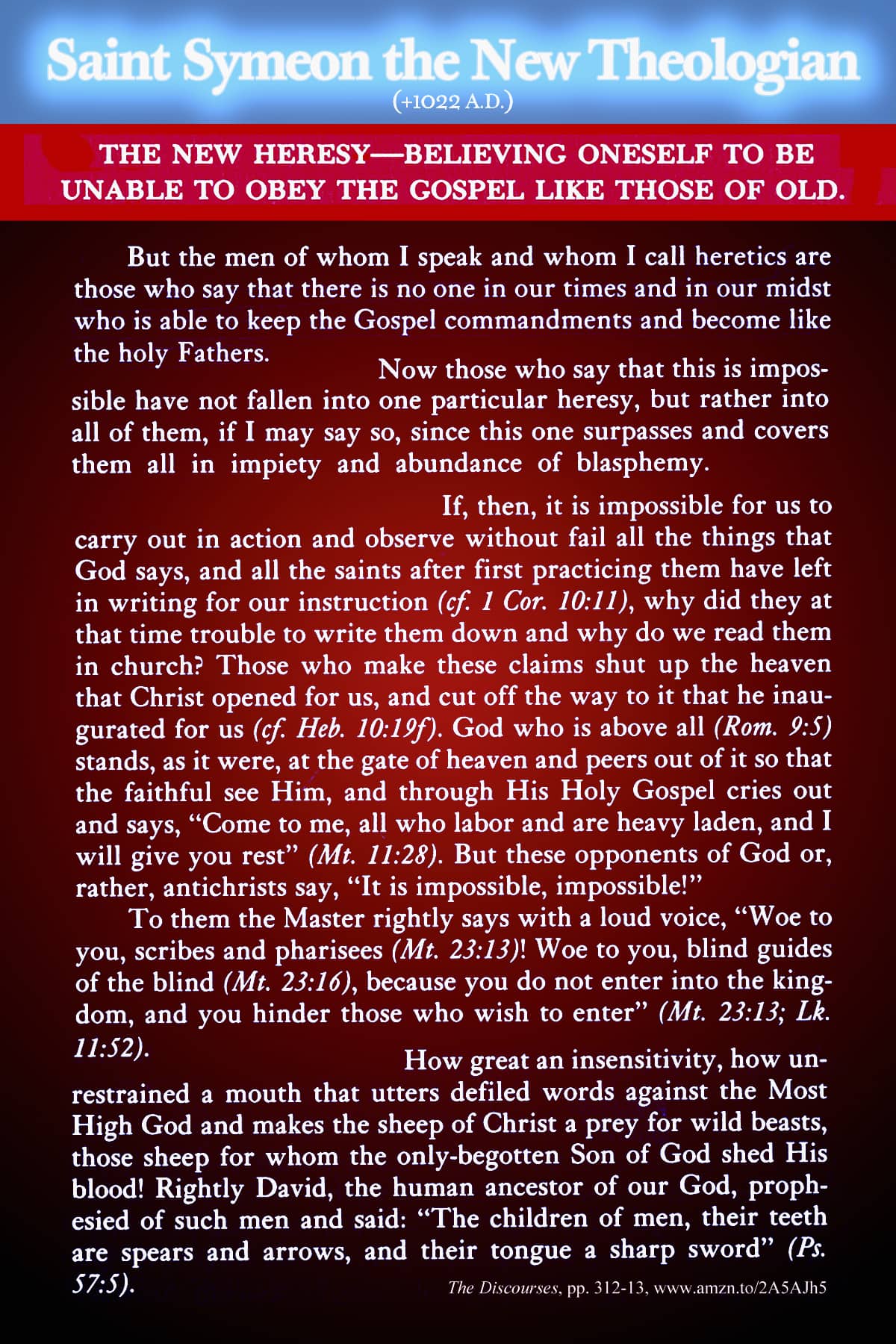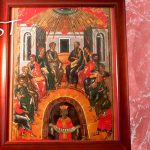
How Christians of the 3rd millennium can apply The Ladder of Divine Ascent in life
Today, the Fourth Sunday of Lent, is dedicated to St. John Sinaitis (ca. 649), better known as St. John of The Ladder (in Greek, Climacos, genitive of Climax). It would be a shame to pass over this Saint, and what he is famous for – the book he wrote, and with which he is identified – without becoming at least somewhat acquainted with it.
As though climbing a staircase, consisting of thirty rungs or grades or steps (an image borrowed from Jacob’s ladder - Gen. 28:12), St. John’s Ladder of Divine Ascent aims to help us rise spiritually, and reach the very heaven. We pray and hope that, with God’s help, we will all derive some spiritual benefit from these reflections.
First, let us ask ourselves a fundamental question: What is our goal in life? The contemplation of God, of course; the beatific vision of God’s countenance in His uncreated light, and our union with divinity itself – this is, or ought to be, our ultimate goal in life.
But how do we get from here to there? We need someone to guide us.
Dante had Virgil to guide him through the forest of sin and error, of hell and purgatory, and Beatrice, as his guide through Paradise. Instead of Beatrice (Dante’s boyhood flame, who died very young), we will have as our expert and sure guide St. John Sinaitis, and his book, which is the fruit of his personal spiritual experience and a product of truly divine inspiration. It has served as a guide for monastics ever since.
What kind of book is The Ladder?
“The Ladder of Divine Ascent is undeniably a classic of early Christian spirituality, which distills the ascetic wisdom of previous generations, and recapitulates the spiritual tradition of the Eastern Orthodox Church. It offers advice, counsel and guidance to those capable of embarking on that difficult road, the summit of which is nothing less than our encounter with God” (Foreword, ix).
But how can this advice, counsel and guidance, offered by a book written almost fourteen centuries ago, help us, the Christians of the third millennium? The answer may be an obvious one: It can help us because the way and the means to get to our final destination remain the same.
While this is true, something has radically changed; something which makes the climb more arduous for us than for the generation St. John was writing for. What is it? – our orientation, which has changed significantly.
Human beings may not have always known the true God, but at least they had a concept of the deity, and respected it. Modern man has replaced God with himself. There is no longer a climb to undertake, a struggle, but a circle, even a vicious one, which leads us back to ourselves.
What does modern man prize most and strive for? Financial success, self-esteem, vanity; one’s rights, unbridled freedom, comfort, good food, relaxation, financial security; being in control, as well as being loved, admired, thanked, appreciated and respected by all.
All these new “values” stand in direct opposition not only to the life of the monastic, but to the essence of Christianity itself.
The starting point of our climb, therefore, is not the same as in previous generations, because never before has man through his technological achievements lifted up his head to his Creator with such arrogance and hubris.
There are those who object that The Ladder was written for ascetics, for monastics who live an austere life of prayer, public and “private”, a life of manual and spiritual labor, a life away from the world, and dedicated to God. So, how can this book speak to us, Christians living in the world?
Contrary to what certain modern “theologians” maintain, followers of Christ living in the world are also expected to live “apart from this world” and apply themselves to at least some form of an ascetical life, and dedicate their lives to God.
Commitment, even consecration to God, is expected of every Christian - turning away from the devil, from one’s self and from the world to face God, as we do at our baptism. Our goal, as we said, is to reach union with God, which is the goal not only of monastics, but of all true followers of the Lord. The monastic ideals are the Christian ideals.
St. John confirms this with his own words,
“A Christian is an imitator of Christ in thought, word and deed, as far as this is humanly possible, and he believes rightly and blamelessly in the Holy Trinity.” (ibid. p. 17)
To follow Christ, to be an imitator of Him and to resemble Him in every respect – this is the aim of every Christian, not just of the monastics. Although the monastics place themselves at a more advantageous position to climb the ladder, the Christians living in the world should also strive to acquire the same virtues and to subdue the same passions.
In recent times, more than a few saintly Orthodox Christians living in the world have been revealed, both men and women – proof that this feat can be accomplished.
Of course, to even undertake the climb one needs to have the desire, the motivation to aspire towards the higher good things, to seek God. If one’s gaze is not oriented toward heaven, how is he going to look for the way that leads there! Therefore, we need to motivate ourselves, we need to develop for ourselves the hunger and the thirst for the Lord. We need to disentangle ourselves from... our selves and the world. We need to re-examine our values. We need, we need, we need... How do we get what we need?
It’s not easy. St. John answers this way:
“At the beginning of our religious life, we cultivate the virtues, and we do so with toil and difficulty. Progressing a little, we then lose our sense of grief or retain very little of it. But when our mortal intelligence turns to zeal and is mastered by it, then we work with full joy, determination, desire, and a holy flame.” (Step 1. ibid, p. 77)
Therefore we need to work hard to acquire what we need, i.e., the longing to know God and to love Him. St. John leads the desirous soul gently, in her peregrinations in search of the Beloved One.
Being an experienced teacher, St. John at first invites us to break our ties with the world through the first steps: renunciation (απάρνηση), detachment (ἀπροσπάθεια) and exile (ξενιτεία). All are necessary.
We then ascend in our climb through the practice of the fundamental virtues of obedience (ὑπακοή), penitence (metάnoia), remembrance of death(μνήμη) θανάτου) and joyful sorrow (χαροποιόν πένθος).
Then follow the corresponding passions that need to be uprooted:
anger (ὀργὴ) eradicated with love and cheerfulness;
malice (μνησικααία) eradicated with forgiveness;
slander (καταλαλιά) with self-criticism;
talkativeness (πολυλογία) eradicated with σιωπή (silence, quietude);
falsehood (ψεῦδος) eradicated with honesty;
despondency (ἀκηδία) eradicated with hope;
gluttony (γαστριμαργία) eradicated with self-denial/self-control/abstinance;
lust (λαγνεία) eradicated with ἀγνεία, purity, hunger, physical exertion;
avarice (φιλαργυρία) eradicated with charity;
insensitivity (ἀναισθησία) eradicated with compassion;
sleep (ὕπνος) eradicated with alertness or vigil;
fear (δειλία) with courage, bravery;
vainglory (κενοδοξία), pride (ὑπερηφάνεια) and blasphemous thoughts (λογισμοὶ βλασφημίας) with humility.
Having concluded the struggle against the passions we return to the higher virtues, those of meekness and simplicity (πραότης and ἁπλότης, humility (ταπεινοφροσύνη) and discernment διάκρισις), to end with the even highest virtues, those of stillness (ἡσυχία) (from which “hesychasm” comes from), prayer (προσευχή), dispassion (ἀπάθεια) and, what are called the three theological virtues faith, hope and love (πίστις, ἐλπίς καὶ ἀγάπη).
We should say at least a few words about these passions and virtues. One renounces the world and detaches himself from its pleasures not because of hate for the world, but because of his love of God. “Exile is a separation from everything, in order that one may hold on totally to God,” writes St. John. Obedience, he comments, is “a total renunciation of our own life... death freely accepted.” Penitence or “repentance” is “reconciliation with the Lord.” Remembrance of death makes us consider each day as our last, and we should anticipate it “as though it were life.” The sorrow that accompanies penitence, is “the grief that comes from loving God.”
The climb sounds arduous–and it is! In spiritual life, progress is made painstakingly. “You need to crawl before you walk,” as the saying goes. St. John puts it this way: You cannot “climb the entire ladder in a single bound.” For our culture of instant gratification and satisfaction, this kind of progress is much too slow – but there is no other way. We want to take the express elevator, however no such shortcut exists.
What do we know about the necessary steps to climb to the top? Very little, and that in a confused way. We don’t like the sound of the initial steps: renunciation, detachment, exile, penitence.
We reject remembrance of death and sorrow. Of the passions named, though we are all guilty of them, we plead innocence. Let’s look at them again: anger, malice, slander, talkativeness, falsehood, despondency, gluttony, lust, avarice, insensitivity, fear, vainglory and pride.
We don’t appreciate the virtues of simplicity, humility and discernment, and we have erroneous notions about the most lofty virtues of stillness, prayer, dispassion and love, especially the last one, love. Incidentally St. John defines love as “a resemblance of God, insofar as this is humanly possible.”
In all this talk about fighting the passions and obtaining the virtues, we ought not lose sight of the fact that spiritual life is not merely a human achievement (the result of human effort – not human effort alone, in any case), but it is a resemblance of the attributes and qualities of Christ God, who alone possesses them to perfection. The life of the spirit is a divine gift, obtained by the eager and desirous soul. But it would be a tragic mistake to believe that it is solely a divine gift, requiring no effort on our part. This is monophyticism at its worst: The divinity absorbing the humanity. Our effort is needed. Our effort, meager and insignificant as it might be, is necessary in the equation. The Fathers put it this way: You’ve got to give blood to get grace.
St. John leads us up The Ladder to divine heights, and helps us transform both body and soul, to transfigure the entire person, rendering it spiritual, holy, divine. He shows us that this requires a constant warfare and an incessant battle to orient and redirect our natural drives from self-serving to serving God, and to restore the new man in the image and likeness of Christ, and thus fulfill God’s plan for us. May we all achieve it with God’s grace, dear brothers and sisters.
Fr. E.H./2000/2021; ed. AH




